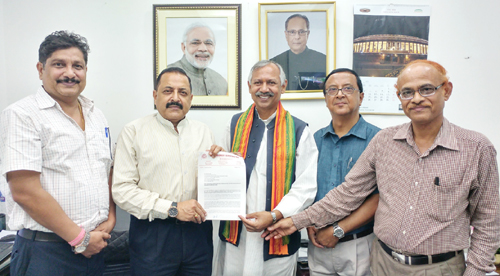
Excelsior Correspondent
NEW DELHI, July 21: In reply to a question in Rajya Sabha today, Union Minister of State (Independent Charge) for Development of North Eastern Region (DoNER), MoS PMO, Personnel, Public Grievances, Pensions, Atomic Energy and Space, Dr Jitendra Singh stated that India’s nuclear generation capacity is constantly on the rise and it will increase three-times by 2024 which is a target laid down by Prime Minister Narendra Modi.
Dr Jitendra Singh said, at present there are 21 nuclear reactors in the country and the current power generation in 2016 is 5780 MW which will increase to 6780 after the new unit at Kudankulam begins functioning which has already passed the criticality phase. By 2019, the nuclear generation will be almost double to the extent 10080 MW followed by 13480 MW by 2023 and three-times thereafter by 2024.
The total electricity generation share of the Atomic / Nuclear Power in the country is 3.4% currently, said Dr Jitendra Singh and added that in the years to come, Nuclear Power will become one of the main sources of energy in the country, along with green source of energy.
Responding to a related question, Dr Jitendra Singh said that India today has world’s largest reserves of Thorium and the Monazite resources in the country are currently to the tune of 11.93 Million Tons which is capable of providing approximately 1.07 ton of Thorium. He said, the “Kamini” reactor in Kalpakkam is the only one in the world using Thorium and it is planned to establish a 300 MW Advanced High Power Reactor using Thorium in the years to come.
Meanwhile, a delegation of doctors working in PSUs led by senior Lok Sabha MP from Bihar Janardan Singh Sigriwal today met Dr Jitendra Singh in his Parliament House office and presented a memorandum demanding parity of enhanced retirement age as provided to the doctors in Central Government Health Services (CGHS) after the Government order issued on March 31, 2015.
Dr Jitendra Singh gave a patient hearing and assured the members of delegation that he will take up their issue with Union Health Minister J.P. Nadda to find out the possible feasibility of their demands.

